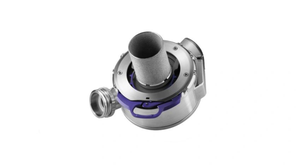Analytical Theory Could Improve Lithium-Ion Batteries
March 11, 2013
Purdue researchers have shown theoretically how to control or eliminate dendrite formation in lithium-ion batteries. Dendrites can cause an internal short circuit, resulting in battery failure and possible fire. (Image courtesy of Quinn Horn, Exponent) |
Lithium-ion (Li-ion) batteries caused quite a stir not long ago by catching fire on the Boeing 787 Dreamliner. But because Li-ion batteries are also used widely in a range of medical devices, concerns go beyond the critical question of airline safety. Short circuits and potential fires in Li-ion batteries are caused by the formation of dendrites, lithium deposits that form on electrode surfaces. Now, researchers at Purdue University (West Lafayette, IN) have demonstrated theoretically that the formation of dendrites can either be controlled or eliminated.
As explained in a paper published in the Journal of the Electrochemical Society, the new analytical theory points the way toward designing experiments to study ways of controlling dendrite growth and shows that the theory enables researchers to predict early stages of dendrite formation. Dendrites grow like tumors while batteries are being recharged. When cut in half, some dendrites reveal an internal structure like tree rings, with each layer representing a single recharge.
When Li-ion batteries are recharged, lithium ions move from the cathode to the anode through a liquid or gel called an electrolyte, from which the dendrites draw material to form on the anode's surface. The dendrites may grow large enough to penetrate the separating barrier and touch the cathode. "The moment these touch, the battery is dead," remarks R. Edwin García, an associate professor of materials engineering at Purdue. "Or worse, if you have too much current going through the dendrites while the battery is being charged, the battery can catch fire."
Based on their analytical model, the researchers have proposed three methods for suppressing or controlling dendrite growth. First, the anode's surface chemistry could be engineered to inhibit the formation of lithium beads at the surface so that it wets the surface instead of nucleating into a dendrite. Second, lithium deposits could be induced to grow uniformly instead of heterogeneously. Heterogeneous growth causes dendrites to form unevenly at various locations on the electrode's surface, and some of these formations can breach the barrier to the cathode. Third, Li-ion batteries could be charged using rapid pulses of electricity instead of a constant current.
"We have developed an analytical theory that identifies the different ways in which lithium-ion batteries can fail during recharge," García comments. "Fundamentally, we proposed a universal roadmap that allows experimentalists and theoreticians to explore the different regimes of behavior during battery recharging. The proposed analytical roadmap enables researchers to identify the charging conditions that will completely suppress or at least minimize the formation of lithium dendrites."
For more information on the use of Li-ion batteries in medical device applications, go to:
How Safe Are Lithium Ion Batteries for Medical Applications?
About the Author(s)
You May Also Like


